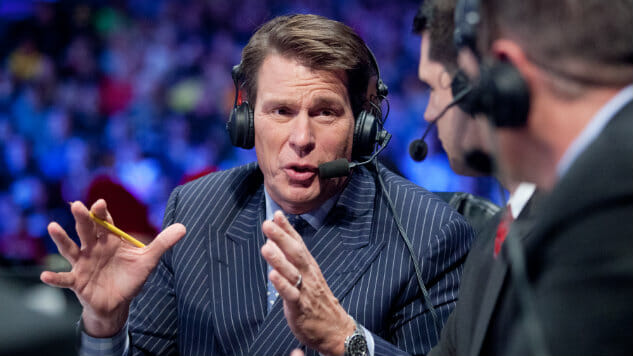It’s Well Past Time for WWE to Deal With its Bullying Problem
Photo courtesy of WWE.com
Mauro Ranallo hasn’t been on WWE television in four weeks. That includes three episodes of its weekly Tuesday night show SmackDown Live, three episodes of its cruiserweight-focused show 205 Live, and the entirety of WrestleMania 33, the company’s biggest event of the year. One of the best announcers in the business, Ranallo adds some much-needed expertise and occasional levity to any broadcast team.
When Ranallo was absent on that first night, March 14, the company blamed the weather: There had just been a massive snow storm in the Northeast, and it was at least believable that travel would be delayed. Then he was gone the next week, and the next.
In reality, Ranallo suffers from bipolar disorder, and was having mental health issues. Normally active on social media, Ranallo went Twitter-silent, leaving fans to speculate that there was something else going on.
There was: According to reporting by Dave Meltzer of the Wrestling Observer, Ranallo was the target of perpetual bully John Layfield, known in the wrestling industry as JBL. JBL had allegedly taken umbrage with Ranallo tweeting about his spot in an Observer poll naming him the best announcer in pro wrestling—an honor Ranallo took pride in—and targeted him for harassment. Ranallo’s friend and colleague Bas Rutten seemed to confirm this story on Twitter, and CBS Sports reported this weekend that Ranallo would not be on WWE television for the remainder of his contract.
To label this an absurdity would be an understatement: That a professional broadcaster tweeted “thanks” to fans and readers of a wrestling publication for receiving an award is about as normal as normal can be. Actors do it, athletes do it, even people in other pro wrestling companies do it. But in the strange carny world of WWE, this was apparently a major faux pas, and JBL was the muscle who would keep Mauro Ranallo in check.
“If this was any company in the real world, JBL would be gone, but it’s not,” Meltzer later said on his radio show. “That behavior is not discouraged there.”
This can no longer be the case. In the company’s role as anti-bullying advocate with its “Be A STAR” initiative, and in its role as an employer whose job it is to keep its employees safe, there can only be one response: WWE must fire JBL.
(Neither WWE nor its Be a STAR partners provided a comment for this story.)
This is not to say that the problem starts and stops with JBL: Those attitudes aren’t created in a vacuum, and in his new book Best Seat in the House, former WWE ring announcer Justin Roberts makes clear that this is an institutional problem.
In an interview with Paste Wrestling, Roberts said he thought he was getting his dream job when he first started working for WWE in 2002. But he would eventually come to see it as a toxic work environment, one he had hoped would improve if he just toughed it out long enough. Justin was let go from the company in 2014, and over that span, he said he endured regular harassment.
“It was extremely challenging, mentally,” Roberts told Paste. “I had worked for so long to get into that spot and it was all I wanted. There was nothing enjoyable at the time though, due to the hell I was going through. I could only hope that it would get better over time and didn’t want to lose my chance by giving up.”
-

-

-

-

-

-

-

-

-

-

-

-

-

-

-

-

-

-

-

-

-

-

-

-

-

-

-

-

-

-

-

-

-

-

-

-

-

-

-

-








































